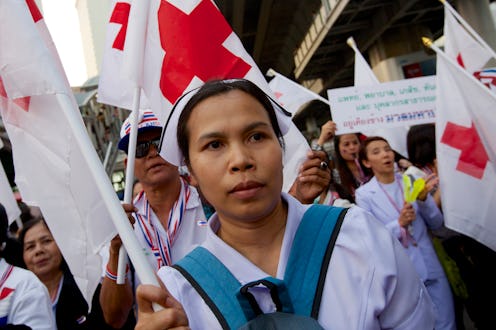News
Thailand’s Going All Sorts of Crazy
Tensions continue to mount in Thailand as protestors continue to call for a new government to overturn Prime Minsiter Yingluck Shinawatr. Protesters allege that Yingluck's government is corrupt and controlled by her exiled brother. Following the assassination of a top pro-government activist leader and a relatively bloody week in the capital that's seen two grenade attacks and nine deaths, the government has imposed a 60-day state of emergency for Bangkok starting Wednesday. Since Jan. 13, protestors have begun shutting down city streets to encroach on government buildings: If they make them unusable, so the theory goes, then the country will be ungovernable.
The order means that the government can censor media, place curfews, use military force to quell violence, break up gatherings, and detain suspects without charge. It's been used before, most recently in 2010, when Suthep Thaugsuban used virtually the same order to quell protests in the capital — back then, he was a deputy prime minister, now he's the leader of the anti-government movement.
While the protests have largely been non-violent since their start in November, creating a "carnival-like" atmosphere in the world's most-visited city, the state of emergency and violence reflect the increasing will of the anti-government protestors to oust Yingluck from her seat as elections, set by her officials for Feb. 2. Protestors want to skip them altogether and bring to power an interim, unelected "people's council." And it's beginning to appear that whether the elections are held or not is something very much in doubt: even members of Thailand's election commission aren't sure whether they'll take place or not.
But despite the state of emergency, the government is remaining passive about the protestors that have begun blockading off Bangkok's streets as part of the city's "shutdown." They've said that they will not stop the protestors on the streets, won't use weapons against them, and won't break up the groups at night (although they could under the order). It's a move of restraint that's impressing other governments, but worrying human rights organization who think that Yingluck might begin exerting serious force if the elections look like they'll be disrupted.
